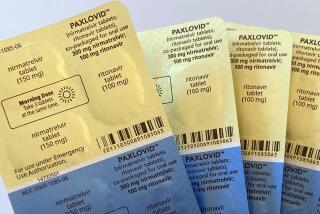HIV Study Questions Early Use of AZT : AIDS: European results contradict U.S. findings that drug delays onset of illness.
- Share via
Preliminary results of a large European study cast doubt on the widespread practice of giving a powerful anti-AIDS drug to people who have the virus but no symptoms of the disease.
Four U.S. studies swayed many doctors to give the drug AZT to infected but symptom-free patients. These one-year studies indicated that the drug helped maintain the level of CD-4 cells, which are white blood cells the virus destroys.
By contrast, the new European study of 1,749 volunteers showed that patients who got the drug were just as likely to become ill or die as those who got a placebo. Conducted over three years, it is the longest trial comparing AZT to a placebo among infected but symptom-free volunteers.
Preliminary results of the study, called the Concorde Trial, are reported in a letter in the April 3 issue of The Lancet, a medical journal.
AZT slows progression of AIDS after symptoms appear. The question is whether it can delay the onset of symptoms.
The results were disputed by some U.S. researchers, who said the results show the need of evaluating treatments using long-term trials.
Previous data from the National Institutes of Health suggested that AZT helps patients with the AIDS virus who have fewer than 500 CD-4 cells.
Dr. Robert Schooley, head of the infectious disease division at the University of Colorado, said he was familiar with the European trial but had not seen all the data.
“I’m still going to go with the NIH data,” Schooley said.
In a statement, the parent organization of Burroughs Wellcome Co., makers of AZT, said the company questioned the conclusions of the European study, in part because AZT was the only drug used.
“Current scientific opinion strongly suggests that combination treatment is likely to provide the next major advance in the management of HIV infection,” the Wellcome Foundation said.
Dr. Ian Weller, an AIDS expert at University College London Medical School who participated in the study, said the “results are not encouraging for early intervention.”
The study involved 1,749 infected men and women from England, Ireland and France. Between October, 1988, and October, 1991, half the participants got one gram of AZT daily. The others got a placebo until symptoms appeared, then received AZT.
After three years, 18% of patients in each group developed symptoms of the disease or died. Scientists said 8% of those who got the drug immediately died, compared to 7% who waited until they had symptoms.
However, those who got AZT right away had significantly higher CD-4 counts, about 30 more cells, compared to patients whose treatment was delayed. These results question the reliability of CD-4 counts to judge therapy, Weller said.






